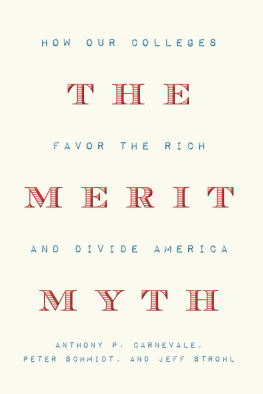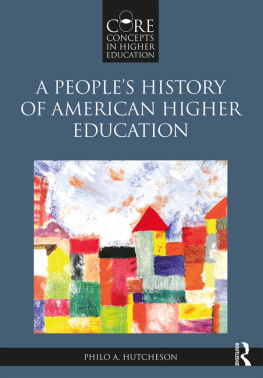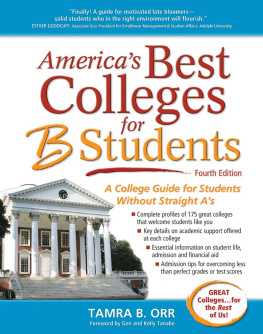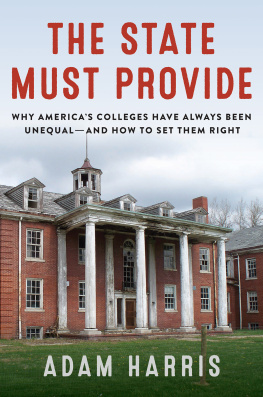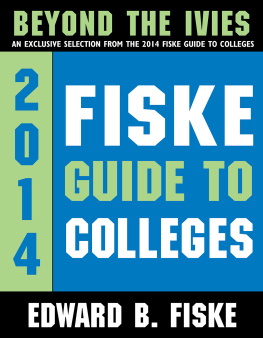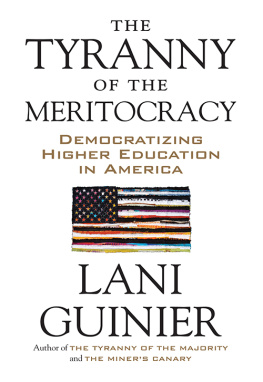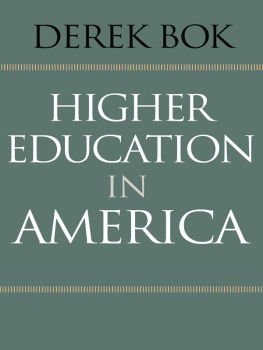
THE MERIT MYTH
Also by Peter Schmidt
Color and Money
THE MERIT MYTH
HOW OUR COLLEGES FAVOR THE RICH AND DIVIDE AMERICA
ANTHONY P. CARNEVALE PETER SCHMIDT JEFF STROHL
To those for whom Americas promise remains unfulfilled.
CONTENTS
THE MERIT MYTH
INTRODUCTION
JARRED AWAKE FROM THE AMERICAN DREAM
T homas Jefferson would have been appalled by the chaos that erupted on the muggy night of August 11, 2017, at his beloved University of Virginia. For sure, many citizens of the nation he helped found viewed the events there with horror.
The fall semester had yet to begin, and the few students already on campus were either conducting or undergoing an orientation for the entering class. A University of Virginia orientation guide published for the occasion offered help to students who felt a bit out of place in a sea of sundresses and ill-fitting khakis and pastel shorts. Few, if any, there actually had any sense of just how hostile the campus environment would soon be. The anti-fascist group Its Going Down had warned on social media of expected trouble, but the universitys top administrators remained oblivious. The campus police had stayed in a business-as-usual mode that anticipated dealing with the usual: noise complaints or kids whod downed too much alcohol.
Then, at about 9:30 p.m., the unthinkable happened: hundreds of white supremacists marched onto the normally idyllic campus. The tiki torches they carried framed their rage-contorted faces as they shouted racial slurs and chanted Jews will not replace us! They surrounded and menaced about twenty counter-protesting students at
The following day, the white supremacists skirmished on the nearby streets of Charlottesville with counter-protesters.
Photographs and videos from that weekend conveyed images that most Americans associate with the rise of the Nazis in 1930s Germany, the Ku Klux Klans terrorization of the South, or coverage of foreign governments teetering on collapse. Not with the twenty-fi st-century United States, and defin tely not with its universities, which typically espouse civility and seek to be models of inclusion for women and members of minority groups.
Yet there could be no denying reality: hundreds of well-organized, neo-fascist thugs had just mounted a disturbing show of force on the campus of a major public university and in the surrounding college town. The orchestrators of that weekends events included Richard B. Spencer, a 2001 University of Virginia graduate who had gone on to lead the alt-right National Policy Institute, and Jason Kessler, a member of the universitys class of 2009.
Expressing disbelief, many Americans asked: Can this actually be happening here? What is this country becoming? Is this really us? A socially aware University of Virginia professor could have seized a teachable moment and chided them for having failed to pay attention. Had they completely tuned out the 2016 presidential election, with its vitriol and racist rhetoric? Had they been oblivious to the headlines and newscasts about social unrest and disruption? Had they ignored the daily torrents of suspicion and hate on Twitter and Facebook?
A self-refl ctive and candid professor, with job protections afforded by tenure, might have dared to suggest the possibility of another teachable moment on how iconic elite colleges such as the University of Virginia had helped to create the conditions for what had just happened there.
Yes, despite lofty mission statements expressing their commitment to advancing the greater good, the University of Virginia and other colleges share some blame for the extremism and social unrest that had just been on display and remain likely to be features of American life for years to come. They are run by, serve, and perpetuate an elite whose members often have seen their self-interests advanced by excluding other segments of the population from political and economic power.
Using selective colleges as gatekeepers, that elite has shut large swaths of the American population out of having access to power, opportunity, and wealth. The effect has been to drive people of different ideologies and backgrounds apart rather than bring them together. Ideally, our colleges would encourage students to eschew prejudice not only as a matter of philosophy, but also in practice, by facilitating interaction among different students and different viewpoints. Higher education is hard-pressed to live up to that ideal, however: expressions of hate have risen on college campuses in recent years, leaving college and university leaders struggling to mount effective responses.
Indeed, instead of being havens of diversity, where Americans of all walks of life can learn from one another, many of our colleges and universities have become isolated communities, where students and faculty largely interact with those who are like them. Many striving working-class and poor white, black, and Latino students fi d themselves stuck outside the gateswith the relatively few who get inside those gates feeling marginalized. Its understandable if these groups come to see colleges and universities as exclusive clubs focused on fast-tracking the elite to ever-higher status.
In a modern republic, colleges should do more than groom successive generations of governing elites. They should prepare student bodies that look like America for participation in a diverse civil society and equip them to reject authoritarian thinking that presumes one race, one faith, one leader, and one way of life. In a modern economy in which two-thirds of jobs require at least some postsecondary education, we rely on our colleges to help young adults achieve fi ancial independence and move up the economic ladder.that allows us the comforting presumption that differences in talent and effort alone are the underlying cause of Americas disparities in income and power.
In the twenty-fi st century, a college education offers the best shot at the American Dream. Thats what we tell our children, regardless of whether we immigrated ourselves, are descended from indigenous Native Americans or enslaved Africans, or have ancestors who came here to build railroads or to escape famine or persecution. We have entrusted our higher-education system with the primary responsibility of providing a path for upward mobility and see our colleges as indispensable in helping Americans fi d their way in our economy, culture, and political system.
We look to our colleges to validate our beliefs that were responsible for our own destinies and that those who are broke or stuck in a lousy job have only themselves to blame. We support our colleges as legitimate social and economic sorting mechanisms because they validate our commitment to individual responsibility and merit. After all, we tend to believe, you have to do the homework and ace the tests to get into the best colleges and move on to the best jobs that confer wealth and power over others.
Fair enough? Not really. In a society where people start out unequal, educational attainment measured by test scores and grades can become a dodgea way of laundering the found money that comes with being born into the right bank account or the dominant race. The college game is fi ed long before the selective college admissions offic s get involved, but college has become the capstone in an inequality machine that raises and perpetuates class and race hierarchies and sinks the lower classes.
In the long pathway from kindergarten to good jobs, the most talented disadvantaged youth doesnt end up doing nearly as well as the least talented advantaged youth. A child from a family in the top quartile of family income and parental education who has low test scores has a 71 percent chance of graduating from college and getting a good job by their mid-twenties. However, a child from a low-income family but with top test scores has only a 31 percent
Next page
